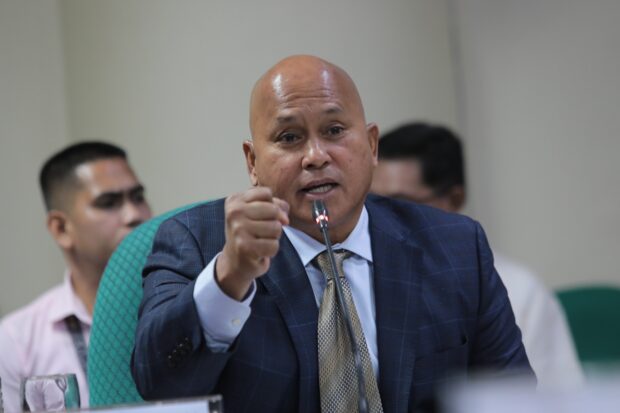MANILA, Philippines — Sen. Ronald dela Rosa on Sunday conceded that the funds of state-run health insurance and pension systems may still be funneled to the Maharlika Investment Fund (MIF) despite senators’ efforts to protect these from being exposed to the contentious wealth fund.
“We passed this law for everyone to comply with it, not for them to find loopholes,” Dela Rosa said in a radio interview, referring to Senate Bill No. 2020, or the MIF Act of 2023, which the Senate approved on May 31.
Passed by both houses of Congress, the MIF Act of 2023 is now an enrolled bill submitted to President Ferdinand Marcos Jr. for his signature and enactment into law.
The senator was reacting to the remarks of Finance Secretary Benjamin Diokno and National Treasurer Rosalia de Leon that the Government Service Insurance System (GSIS) and the Social Security System (SSS) may still invest in the projects that the MIF would support.
Dela Rosa, one of the 19 senators who voted for the measure sponsored by Sen. Mark Villar, said senators created Sections 6 and 12 to expressly prohibit the GSIS, SSS, Philippine Health Insurance Corp. (PhilHealth), Philippine Veterans Affairs Office and other similar state agencies from investing in the MIF and the Maharlika Investment Corp. (MIC).
But Dela Rosa said he was later informed that the agencies could still invest in the MIF via coursing the funds through a third party, such as an investment company, which will be the one to invest in the MIF.
Return the bill to committee
“If the funds [were] placed in another investment company, which would then invest in the [MIF], that’s technically and legally sound,” Dela Rosa said. “It’s perfectly legal if they will do that … They will not be violating the law.”
If the bill needs revisions, Deputy Minority Leader France Castro on Sunday suggested that the Senate just return the bill to its Committee on Banks, Financial Institutions and Currencies for revision instead of waiting for an admonition from the Supreme Court on its legality.
In a text message to the Inquirer, Castro pointed out: “They should no longer be touching the ratified Maharlika bill along with its many errors because that would be tampering with the law and, therefore, unconstitutional … There should be no revisions now, just typographical editing if ever.”
“To avoid being taken to the Supreme Court, they should just return it to the committee and further discuss the measure,” said the ACT Teachers party-list representative.
In a radio interview aired on Sunday, the representative maintained that the Senate should no longer be making revisions on the MIF bill ratified by Congress due to be submitted for Malacañang’s approval, suggesting that the Senate instead remand the measure to the committee level for further debate and new ratification.
Power of the purse
She further argued that the MIF could take away the power of the purse from Congress and pointed out that the ban on investments from the SSS, GSIS, PhilHealth, Pag-Ibig Fund, Overseas Workers Welfare Administration, and Philippine Veterans Affairs Office only pertained to the seed capital.
“The agencies could still invest in MIF-initiated projects because the prohibition is only for investing in the seed fund,” she pointed out.
She further explained in a text message to the Inquirer, “As for taking away the power of the purse of Congress, the MIF can do this because by itself it can build roads, bridges, and projects that Congress should have the power to allocate and scrutinize.”
“They would remove the power of Congress to scrutinize these projects and open up a huge opportunity of being a source of corruption,” the lawmaker pointed out in Filipino.
“Another important point, if the MIF creates infrastructure projects [through its P500 billion-seed fund] instead of through the national budget as enacted by Congress — the highways, roads, and bridges will be for profit,” she stressed.


